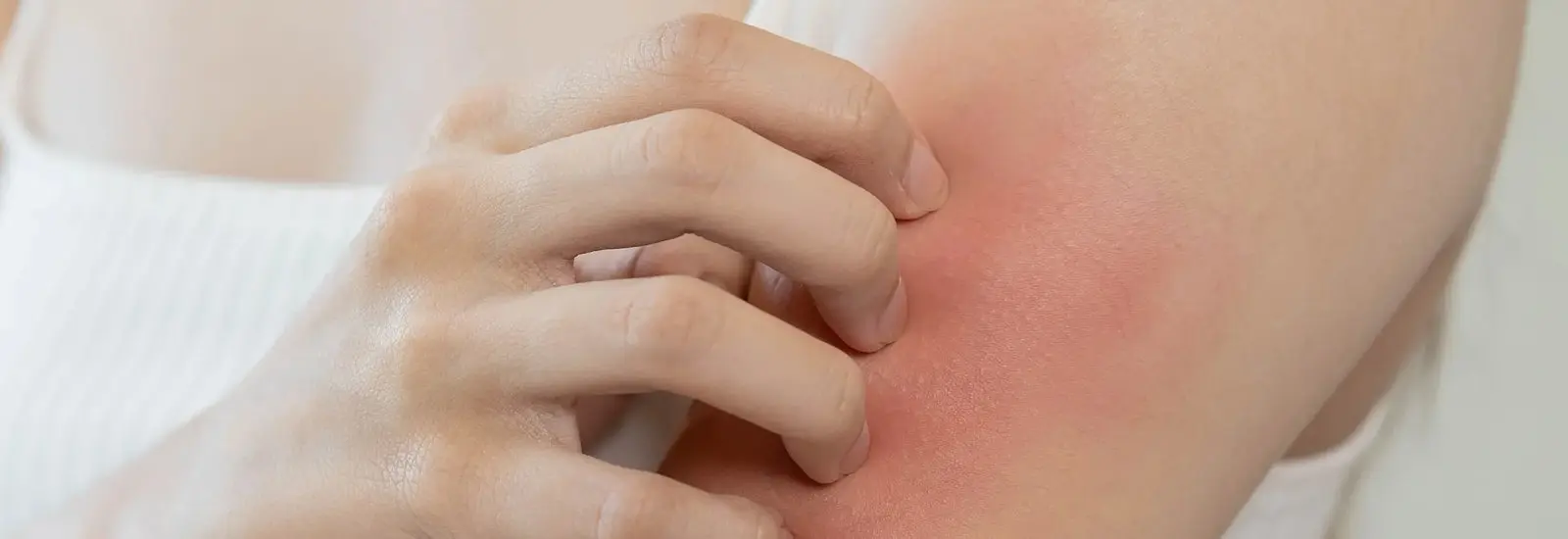When browsing the skincare aisles, you've probably seen products geared toward sensitive skin. But how do you know if you have sensitive skin? If you're unsure whether this description fits your complexion, it can be challenging to narrow down your options and find the best products for you. Sensitive skin is an umbrella term that describes skin prone to symptoms like redness, swelling, itching, burning and dryness. Potential triggers can include personal care products, from cosmetics to laundry detergents.
So, learning how to know if you have sensitive skin and using the right products is essential to avoiding sensitive skin concerns and supporting a healthy, comfortable complexion.
Understanding sensitive skin
Sensitive skin tends to be reactive skin. Whereas someone with "normal" skin might be able to try a range of new products without adverse reactions, people with sensitive skin are more likely to react to products that don't agree with or complement their skin type. These reactions can be uncomfortable.
When it comes to understanding how to treat sensitive skin, identifying skin sensitivity is the first step. You can then avoid ingredients that exacerbate your symptoms and find products that fortify your skin barrier since a damaged skin barrier is associated with sensitive skin conditions.
Identifying sensitive skin
According to worldwide surveys, approximately 60% to 70% of women and 50% to 60% of men report having some degree of sensitive skin. If you're wondering how to recognize if you have sensitive skin, you can look for a few tell-tale signs.
The Journal of Cosmetic Dermatology explains that sensitive skin (also known as cutaneous sensory syndrome) can result in unpleasant sensory responses to certain stimuli, including:
Stinging or burning
Irritation
Flushing
Tenderness
Dryness
Itching
Signs of sensitive skin can vary and may also include redness and breakouts.
While sensitive skin is common, the Journal of Cosmetic Dermatology explains that it can be associated with skin conditions such as eczema, psoriasis, seborrheic dermatitis, acne and rosacea. So, it's a good idea to talk to a dermatologist about your skin concerns. They can help diagnose any issues and recommend a sensitive skincare routine and sensitive skin products that are best for your skin.
How to know if you have sensitive skin
So, how do you know if you have sensitive skin? Here are five indicators of skin sensitivity.
1. Persistent redness
Redness — including red rashes, red bumps and flushing — is a common sign of sensitive skin. However, the effects of skin sensitivity vary from person to person, depending on factors like age, location, lifestyle and ethnicity. For example, one study showed that Caucasian people with sensitive skin were more likely to report skin redness and swelling, while Asian and African American people claimed more sensory effects like burning and stinging.
2. Irritation and itching
Your skin may feel itchy when you're having a reaction. Scratchy fabrics like wool and scented soaps and laundry detergents can often exacerbate itchiness since fragrances are common irritants for sensitive skin.
3. Dryness and tightness
Sensitive skin is prone to dryness, which can make your skin feel taut (like a rubber band). Several factors can cause dry skin in sensitive skin types, including long, hot showers and products that strip your skin of its natural oils or damage your skin barrier, which regulates skin hydration and maintains water content.
4. Reactions to products
Noticing a rash, swelling, redness, itching, burning or bumps soon after using a new product (referred to as contact dermatitis) is a good sign you have sensitive skin. Ask your dermatologist for their recommendations on which ingredients to look for and which to avoid.
5. Sun sensitivity
All skin needs protection from the sun's ultraviolet A (UVA) and UVB rays, but sensitive skin can be particularly reactive to sun damage. Sun damage can compromise skin barrier function, and people with sensitive skin tend to have compromised skin barriers to begin with.
Skincare routine for sensitive skin
Before you start a sensitive skincare routine, connect with your dermatologist to identify the specific ingredients that irritate your skin. Then, perform a patch test with any new products before using them fully. Once you have the green light, follow these steps.
Cleanse
Wash your face with a gentle cleanser that won't strip the skin's moisture barrier, like Neutrogena® Ultra Gentle Daily Cleanser for Sensitive Skin.
Pat dry
Rinse with lukewarm water and pat dry with a soft, clean towel. Don't rub, scrub or use a rough towel.
Moisturize
Apply a gentle moisturizer like Neutrogena® Daily Facial Moisturizer Fragrance Free to soothe, hydrate and support skin barrier health.
Apply sunscreen
In addition to other sun safety practices, apply sunscreen formulated for sensitive skin every day. Look for physical, or mineral, formulas containing zinc oxide or titanium dioxide that are free from fragrances, parabens, dyes and phthalates. Try a formula like Neutrogena® Sheer Zinc Face Dry-Touch Sunscreen Broad Spectrum SPF 50 for Sensitive Skin. This mineral sunscreen was awarded the National Eczema Association Seal of Acceptance™, deeming it suitable for people with sensitive skin conditions.
Follow up with foundation (optional)
If you like to wear makeup, follow up with a foundation like Neutrogena® Sensitive Skin Serum Foundation. This serum-infused foundation provides natural-looking, buildable coverage that soothes skin and visibly reduces redness with vitamin B5 — and it's free from fragrances, dyes, parabens, phthalates, sulfates and alcohol.
Caring for sensitive skin
Paying attention to your skin is one of the best ways to care for its health. Look out for reactions like redness, itching, dryness and generally irritated skin after using new products or in response to excessive sun exposure or extreme temperatures. Whenever possible, choose gentle, fragrance-free products formulated specifically for sensitive skin.
Beyond at-home skincare for sensitive skin, connect with your dermatologist to learn more about possible triggers and get a personalized skincare regimen. Sensitive skin is beautiful skin — it just needs a little more TLC!
FAQ
What is sensitive skin and what are its characteristics?
Sensitive skin is a skin type that reacts easily to allergens or irritants. Common characteristics are skin redness, swelling, itching, burning and dryness. Sensitive skin may be associated with skin conditions like eczema, psoriasis, seborrheic dermatitis, acne and rosacea.
How can I tell if I have sensitive skin?
One of the best ways to tell if you have sensitive skin is if you have a skin reaction after applying a topical product to your skin, wearing a specific material (like wool) or wearing clothing treated with a new or different detergent.
What are common triggers for skin irritation and allergic reactions?
Common triggers for skin irritation and allergies include dyes, fragrances and perfumes. Some people may also be sensitive to sulfates, parabens, phthalates, alpha hydroxy acid, petroleum, glycolic acid, alcohol (or ethanol), benzoyl peroxide and lactic acid.
How should I adjust my skincare routine for sensitive skin?
When taking care of sensitive skin, think gentle. Never scrub or rub at your skin. Look for skincare products free of fragrances, perfumes and dyes, and opt for gentle formulas that fortify your skin barrier.
When should I seek medical advice for my sensitive skin concerns?
Consult your healthcare provider if your symptoms worsen or you're having trouble identifying which product or irritant is causing a reaction. They can perform tests to determine what might be causing your symptoms.





